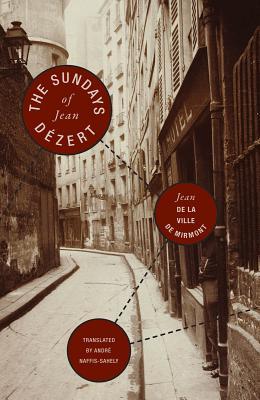Jean de La Ville de Mirmont left behind one undisputed classic, self-published a few months before he would meet his fate on the front lines of World War I: an understated, almost humorous tale of urban solitude and alienation that outlines the mediocrity of bureaucratic existence.
Jean Dzert is an office worker employed by the ministry, who rounds out his regimented life with snippets of Eastern philosophy, strolls through the city and consumerist efforts at injecting content into his life by structuring his Sundays through a rigorous use of advertising flyers that take him from saunas to vegetarian restaurants to lectures on sexual hygiene. In his mortal boredom, his modernist engagement with the banality of the everyday and his almost heroic resignation to mediocrity, Jean Dzert emerges as something of a French counterpart to Herman Melville's own rebel bureaucrat, Bartleby the Scrivener--save that when it comes to being an existential rebel, Jean Dzert goes even further in his will to prefer not to. "Jean Dzert is like a brother to me," wrote Michel Houellebecq, "because of his ability to escape despair by means of emptiness." Jean de La Ville de Mirmont (1886-1914) was killed by a shell explosion on the World War I battlefront. He left behind a collection of poetry that would be published posthumously, a collection of short stories and the novella for which he is remembered, The Sundays of Jean Dzert.
Jean de La Ville de Mirmont left behind one undisputed classic, self-published a few months before he would meet his fate on the front lines of World War I: an understated, almost humorous tale of urban solitude and alienation that outlines the mediocrity of bureaucratic existence.
Jean Dzert is an office worker employed by the ministry, who rounds out his regimented life with snippets of Eastern philosophy, strolls through the city and consumerist efforts at injecting content into his life by structuring his Sundays through a rigorous use of advertising flyers that take him from saunas to vegetarian restaurants to lectures on sexual hygiene. In his mortal boredom, his modernist engagement with the banality of the everyday and his almost heroic resignation to mediocrity, Jean Dzert emerges as something of a French counterpart to Herman Melville's own rebel bureaucrat, Bartleby the Scrivener--save that when it comes to being an existential rebel, Jean Dzert goes even further in his will to prefer not to. "Jean Dzert is like a brother to me," wrote Michel Houellebecq, "because of his ability to escape despair by means of emptiness." Jean de La Ville de Mirmont (1886-1914) was killed by a shell explosion on the World War I battlefront. He left behind a collection of poetry that would be published posthumously, a collection of short stories and the novella for which he is remembered, The Sundays of Jean Dzert.Paperback
$12.95